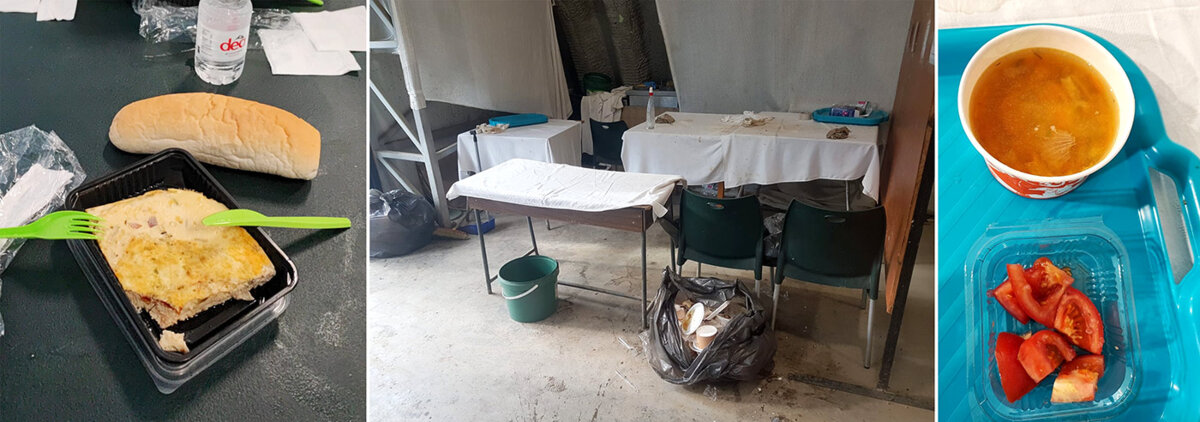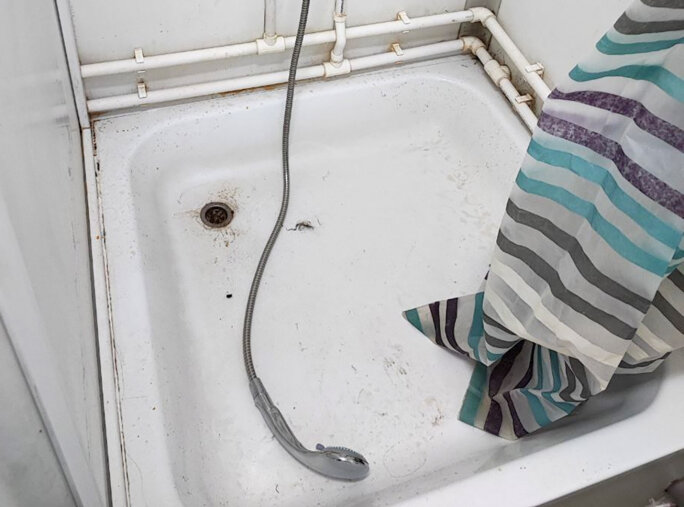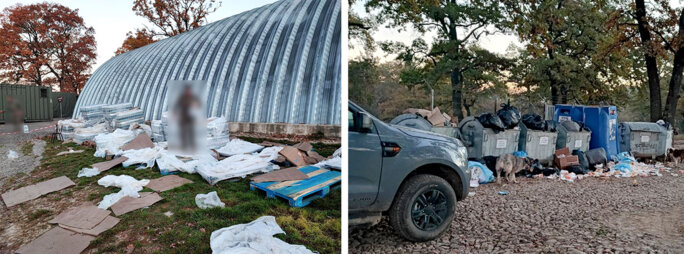It was a rapid and meticulously-choreographed visit. On Thursday November 3rd France's minister for the armed forces, Sébastien Lecornu, went to the military camp at Cincu in central Romania where French soldiers have been deployed since February as part of a NATO mission. He arrived to military salutes and formally inaugurated various bits of infrastructure, while most soldiers were asked to stay discreetly out of sight, apart from a few hand-picked troops. Nothing was allowed to tarnish the image of a minister being out and about on the front line.
However, the everyday reality for the more than 700 French soldiers who live in the camp at Cincu is rather less glorious than the official discourse – which endlessly repeats France's unswerving commitment to the mission – might suggest. Though the soldiers based there are accustomed to external operations, a number of them say the living conditions at the camp are not up to standard, citing a lack of food, unfit accommodation and a haphazard heating system. And they fear that things will only get worse this coming winter.
The French army's general staff insist that their soldiers' living conditions are an issue of “constant concern” and they highlighted the improvements that have been made since the French force was first deployed. And, by implication, they blamed any problems on the Romanians, who have placed the Cincu camp at France's disposal. “The unexpected posting of a large force very often leads to basic conditions in the initial deployment,” the general staff said in response to Mediapart's questions. “Generally one has to rely on the existing capacities of the host nation before progressively gaining autonomy for a long-term detachment, along with suitable infrastructure.”
Omelette and bread from the day before
Operation Aigle, as the mission is called, was launched on February 28th this year, four days after Russia's invasion of Ukraine. Its aim is to “reinforce NATO's defence and deterrent posture” and to “consolidate the protection of Europe's eastern flank”. The French military took command of the operation, which also involves Belgian and Dutch soldiers.
France has therefore been using the Romanian army's training camp for eight months. And yet the living conditions are still poor.
The first issue is food. The meals, supplied by Romanian allies, have limited portions: soup and tomatoes for one dinner, omelette and bread from the day before for the next one. Sometimes the meals include neither a starter or a dessert, even though the soldiers are hungry from physical exertion and the cold. “I'm hungry,” complained two soldiers in messages sent to relatives and colleagues and seen by Mediapart.

Enlargement : Illustration 1

Families back home have been obliged to make up any shortfalls through food parcels sent at their own expense, with soldiers celebrating the arrival of packets of crisps and saucisson. For the last few days meals have consisted of collective “combat rations” that ordinarily are dished out in emergency situations. “In normal times it's seen as a kind of punishment, on this occasion we were all happy,” admitted one soldier.
Several troops apparently asked their superiors if they could be supplied with more substantial meals but in vain. The French military did not deny there was a problem but insisted that “the meals are getting better qualitatively and quantitatively with, in particular, the addition of extra food, more dairy produce and fruit”.
Photos show that the kitchen in the French canteen is not in a very appealing state and some water and part of the food is stored outside because of a lack of space – packaging, boxes and palettes litter the canteen floor. Power cuts sometimes force the soldiers to eat by the lights of their mobile phones.
When questioned on this the French army's general staff admitted there had been “some cuts” in the water supply but that these had “quickly been looked into”, and that there had been “some malfunctions” in the electricity supply. But they said that there were “already plans to overhaul the electrical system”.
The accommodation facilities, meanwhile, are more akin to what one would expect for a temporary camp for a few days or weeks rather than for a mission that will doubtless last several years; according to a senior officer interviewed by Le Figaro in June, it could be “four to five years”.

Enlargement : Illustration 2

Around 450 French military personnel, mostly officers and non-commissioned officers and new arrivals, are housed in prefabricated huts. Until recently these had been used for the French military's anti-terrorist mission in the Sahel region of Africa known as Operation Barkhane. Some soldiers at Cincu say that these huts were neither cleaned nor disinfected before being sent to Romania – something the military denies – and that they do not have the necessary equipment to scrub them correctly. This seems to be confirmed by photos showing traces of mud, mildew, and hair in the shower trays. Some of the huts are not completely watertight and leak during heavy rain. Because of a lack of camp beds, more than 200 extra ones had to be urgently ordered from a civilian company.
The rest of the French military personnel, some 250, are housed in collective tents. “Each tent is equipped with electricity and heating with a fuel-powered hot air generator,” insists the general staff. But personnel at Cincu say that, on the contrary, these collective tents are not always properly heated, because of a somewhat haphazard refuelling system. This is a real issue when the average temperature at Cincu in November is -2°C and the thermometer can dip as low as -19°C.
Mud, mice and stray dogs
Around 250 military personnel share five toilets – hired chemical toilets - and it is not uncommon for toilet paper to run out. Out of 16 mobile shower systems installed for those living under canvas, just six work correctly. And according to some soldiers at Cincu and the relatives with whom they are in regular contact, more than 700 military personnel have to share one washing machine. This in a camp that has become a “quagmire”, where there are mice, bed bugs and stray dogs attracted by overflowing rubbish bins.
When asked about these hygiene issues, the French military said that the number of showers and washing machines was sufficient and that the remaining issues will soon be sorted. The military authorities said that they would soon have “our own rubbish tip” with a rubbish discharge system – until now waste disposal has been handled by the Romanians. The French authorities also said that “new toilets have been ordered, of which a large number were delivered at the end of October”.
“I'm hungry, I'm cold, I'm tired,” said one soldier who is part of Operation Aigle in a message sent to a relative on WhatsApp and seen by Mediapart. Many fear the coming winter. In December and January the temperature can go down to -30°C at Cincu. One French soldier said that the work that is supposed to improve accommodation facilities at the site – which will have to house a total of a thousand male and female military personnel by the end of the year – has already been made difficult by the weather conditions.

Enlargement : Illustration 3

Meanwhile the dozen or so Leclerc tanks dispatched by France to Romania in order to strengthen NATO's “deterrence posture” and whose departure on October 18th was duly announced, filmed and photographed, have still not arrived, for reasons that remain unclear. Mediapart understands that they might not arrive at their destination until the start of December.
'Never seen such a shambles'
Soldiers are certainly used – and trained – to cope with basic surroundings. But as personnel at Cincu and their relatives point out, these conditions are usually reserved for the battlefield and emergency situations and not for life on a rear support base in a European country where the French army has had eight months to set up. “These questions clearly would not be asked if one were under fire in a field of conflict” but “Romania is a non-belligerent support base. How does one explain the lack of preparation and the logistical failures in this case?” asked one retired soldier, the parent of someone deployed in Romania.
Among those who have expressed their anger to relatives is a soldier who has been involved in 12 external operations and who says he has “never seen such a shambles”, an NCO with seven missions under his belt who says he was “much better off in Mali”, and an officer who is “disgusted to the point of not wanting to go on an operation again”.
One French soldier present at Cincu sums it up bluntly: “I'm not in a country at war, I'm not even on an external operation, I'm on an operational deterrence mission. In blunt terms our army is supposed to 'scare'. Here we frighten no one, we're just pitied. There's nothing glorious about the French army when you see it at Cincu, with people's feet in the mud, empty stomachs, deep bags under the eyes, all the while trying to frighten Russia with defective resources, lorries bogged down in the mud and tanks which are struggling to get through the Carpathian mountains.”
-----------------------------
- The original French version of this article can be found here.
English version by Michael Streeter
-------------------------
If you have information of public interest you would like to pass on to Mediapart for investigation you can contact us at this email address: enquete@mediapart.fr. If you wish to send us documents for our scrutiny via our highly secure platform SecureDrop please go to this page.
-------------------------


